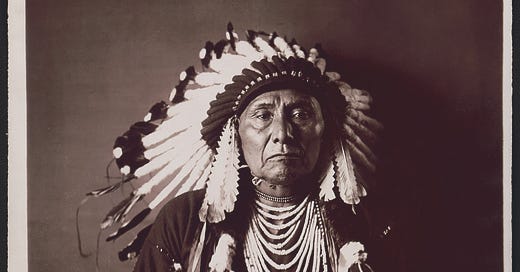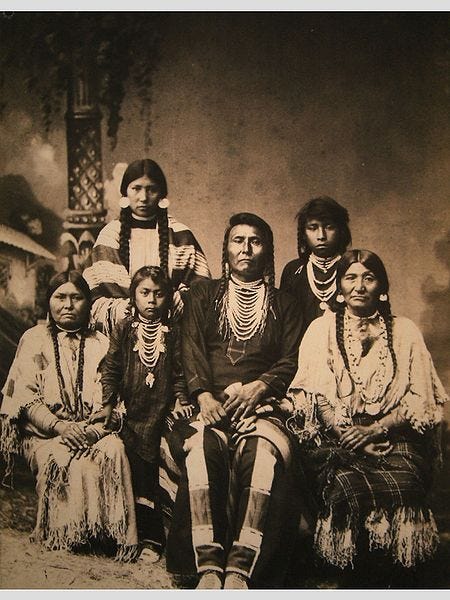It’s the summer of 1877, and Chief Joseph and his Wallowa band of the Nez Perce people face a daunting 1,200-mile journey from home to the Canadian border. Once there, they hope to resume life as it once was before the U.S. government began forcibly relocating the tribe to reservations. This latest order demanded that they move to a reservation in Idaho.
Initially, Chief Joseph agreed to comply. But he learned soon after that some men in his tribe had killed a few settlers. Fearing swift retaliation, Chief Joseph decided to lead his people—about 700, including 200 warriors—toward Canada, where they hoped to find safety beyond U.S. jurisdiction.
The journey is grueling, filled with battles and constant challenges as they attempt to evade the U.S. Army. For a long while, they are successful. But on October 5, 1877, Chief Joseph and the tribe are forced to surrender just forty miles from the Canadian border. “My heart is sick and sad. From where the sun now stands, I will fight no more forever,” Chief Joseph declares.
General O.O. Howard, who led the U.S. troops, later reflects on the respect he holds for Chief Joseph’s leadership, admitting, “I do not think that I had to exercise more thorough generalship during the Civil War than I did in the march to the battlefield and the ensuing battle with Joseph and his Indians on the banks of the Clearwater.”
After their capture, the tribe is sent to a reservation in Kansas, where disease takes many lives. Chief Joseph survives and, for many years afterward, speaks out against the injustices his people suffer, advocating for Native American rights.
On September 21, 1904, Chief Joseph passed away at the Colville Indian Reservation in Washington State.
Among the wisdom he left behind are these powerful words:
“Too many misinterpretations have been made; too many misunderstandings have come up between the white men and the Indians. If the white man wants to live in peace with the Indian he can live in peace. There need be no trouble. Treat all men alike. Give them the same laws. Give them all an even chance to live and grow. All men were made by the same Great Spirit Chief. They are all brothers. The earth is the mother of all people, and all people should have equal rights upon it. You might as well expect all rivers to run backward as that any man who was born a free man should be contented penned up and denied liberty to go where he pleases. If you tie a horse to a stake, do you expect he will grow fat? If you pen an Indian up on a small spot of earth and compel him to stay there, he will not be contented nor will he grow and prosper. I have asked some of the Great White Chiefs where they get their authority to say to the Indian that he shall stay in one place, while he sees white men going where they please. They cannot tell me.”
Note: While we’ve chosen to use Chief Joseph’s English name in the story, his original name was Hin-mah-too-yah-lat-kekt.
Sources:
Chief Joseph to the Commissioners of the Treaty of 1876 (Warren, Robert Penn, and R.P.W. “Chief Joseph of The Nez Perce.” The Georgia Review, vol. 36, no. 2, 1982, pp. 269–313. JSTOR, http://www.jstor.org/stable/41399718. Accessed 27 Oct. 2024.)
Haines, Francis. “Chief Joseph and the Nez Perce Warriors.” The Pacific Northwest Quarterly, vol. 45, no. 1, 1954, pp. 1–7. JSTOR, http://www.jstor.org/stable/40487055. Accessed 27 Oct. 2024.
Hin-mah-too-yah-lat-kekt, also known as Chief Joseph, Nez Percé chief, in traditional dress. Photograph. Retrieved from the Library of Congress, <www.loc.gov/item/2001697398/>.
Today in History – October 5th: Library of Congress
Wikimedia Commons, Wikimedia Foundation, https://commons.wikimedia.org/wiki/File:Chief_Joseph_and_family.JPG - photograph by F.M. Sargent, Washington State History Museum
Wikiquote, Wikimedia Foundation, https://en.wikiquote.org/wiki/Chief_Joseph






I’ve not heard all of these accounts about how the wise, benevolent, brave, generous Hin-mah-too-yah-lat-kekt conducted himself before. TY for this post, the sources and the pictures.
Thank you for sharing this vital piece of history. History must be shared and passed on